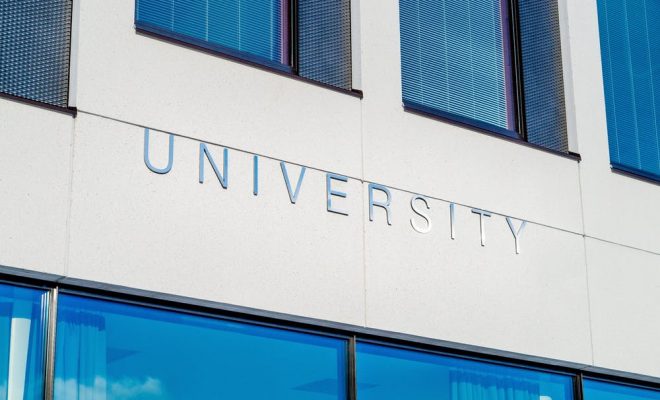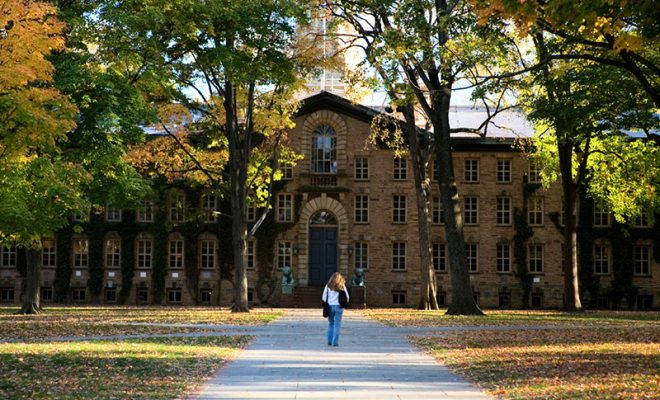2023 Best Online Master’s in Gifted and Talented Education Programs

Click here to find out more about the ranking methodology that we used to compile this list.
Congratulations! If you represent a college or university that is included in this list, please collect your seal below.
Deciding which college to attend can be a daunting task. For many, it will be the most important decision that they make in their lives. To make an informed decision, you have to consider a lot of variables, such as cost of attendance, financial aid, student/teacher ratio, academics, student life, and more. These factors will either positively or negatively impact the quality of education that you receive.
Do you want to acquire an online master’s degree in gifted and talented education, but don’t know what institution you should attend? Well, if you are as ambitious as I was in my late teens, then you want to attend a top school, instead of an average or mediocre one. Fortunately, we have already done the legwork for you. To help you find the right school for your interests and goals, we’ve compiled a list of 2022’s best online master’s in gifted and talented education programs.
What institution did we forget? Leave your thoughts in the comment section below.
The University of Alabama is a legendary state institution of higher education that prides itself on empowering its learners via athletic, academic, and professional achievements. The oldest state institution in the state, Bama, accommodates learners of all backgrounds, including distance learners. The school’s online offerings consist of a master of arts in special education with gifted and talented licensure. This is a blended degree program, which combines online and web-assisted learning.
The degree requires 30 to 36 credits, with classes in concepts such as creative problem solving, special populations in gifted education, and diagnosis and assessment of exceptional youth. Learners must also finish an internship, which begins with a mandatory skills development and enrichment workshop hosted over the summer. A practicum and holistic exam are also part of the degree prerequisites. With such an intensive coursework, this degree program trains learners to not only identify the unique needs of gifted and talented kids but also to strategize and implement differentiated educational programs that challenge and empower them. Graduates often work in careers as teachers, administrators, and academic advisors.
Candidates must hold an Alabama Class B teacher licensure or equivalent, have a minimum 3.0 GPA, earn 300 on the GRE for admission. Tuition rates are reasonable for all distance learners, and scholarships are available.
The University of Missouri is a leader in distance education. It has more than 100 degree programs, including a master of education in special education with an emphasis in gifted education. Mizzou Online’s degree program offers coursework that is skill-based and career-focused. Graduates of the degree program are also qualified to obtain the Missouri gifted education licensure.
The degree requires 30 credits and includes courses such as curriculum leadership, assessment and evaluation in gifted education, and technology to improve learning. Learners must also finish a practicum; learners who have two years or more of teaching experience in state-assisted gifted programs may apply for an exemption.
Candidates must pass a holistic take-home exam. Candidates must also submit institution transcripts with a minimum 3.0 GPA, GRE scores, and two letters of recommendation to be considered for admission to the degree program. The university provides an array of online services, resources, and supports for its learners, including admissions help and financial assistance, along with professional development and tutoring services via The Learning Center.
The University of Georgia offers an online master of education in educational psychology, gifted and creative education. This degree is focused on delivering the skills necessary to nurture the specific needs and talents of all children, particularly those in disadvantaged and underserved populations. All classes can be finished remotely, and most learners can earn their degrees in six terms or two years.
To obtain the MEd degree, learners must complete at least 37 credits and pass a written holistic exam. The coursework consists of classes in advanced concepts such as characteristics of gifted youth and programming and coursework for the talented. All learners take the same courses in the first two terms, which builds cohort relations, thereby easing the transition into graduate school and building a network of long-term professional support. Subsequent classwork is planned with close guidance from academic advisors. Learners round out their master’s in gifted education online degree with a practicum, which readies them for career entry or advancement via real-world application of learned skills. Learners may fulfill this prerequisite at their workplace or separate locations facilitated by the degree program.
Application materials consist of college transcripts with a minimum 2.6 GPA, GRE or MAT scores, and three letters of recommendation. Online learners can also apply for graduate scholarships.
From its primary campus, the University of South Florida offers opportunities for to advance their careers via accreditation and advanced skills development. The school’s online offerings consist of a master of arts in exceptional learner education, which is an intensive degree program that builds on the education and special education foundations that learners already have; The program delivers in-depth examinations of several types of exceptionalities, such as learning disabilities, behavioral disorders, and intellectual disabilities. Learners may select to concentrate in one of three areas, or they can opt to work on a generalist path.
The degree requires 32 to 40 credits, depending on which path a learner chooses. The degree requires classwork in core areas such as working with families, advanced psychoeducational assessment, and consultation and collaboration in special education. Learners must also finish at least one hour of independent study and a practicum, the latter of which consists of supervised fieldwork with exceptional children, ranging from preschoolers to high school learners. The online master’s in gifted education degree program at USF is holistic; it does not automatically lead to initial teaching licensure; learners must take further steps to fulfill those specific licensure requirements.
The University of North Carolina at Charlotte is the fastest growing campus of the UNC system. The school has 64 master’s degree paths, many of which are available to online learners, including the master of education in special education—academically or intellectually gifted. Explicitly intended for K-12 educators who hold at least an initial or Standard Professional one (SP1) teaching license, this master’s degree program offers graduates the skills they need to enrich and improve the education of high-achieving learners.
The degree consists of 33 credits of writing-intensive classwork covering concepts such as methods of instructing gifted learners, concepts on creativity, and adapting coursework material. Additionally, UNCC’s online gifted education degree program heavily stresses research. Learners not only study the best practices in the field but also carry out research. With the guidance of a faculty advisor, learners formally propose, implement, examine, and present their work, enabling them to get valuable experience and build professional relationships outside their immediate academic setting.
Application materials consist of a bachelor’s degree with a minimum 3.0 GPA and GRE or MAT scores in the 30th percentile or higher. Online learners pay tuition based on their residency status.
The University of North Texas (UNT) has been delivering reasonably priced and exceptional education for over 127 years. Facilitated by Blackboard, UNT has 20 online graduate programs, including a master of science in educational psychology with a concentration in gifted and talented. This UNT degree program is highly adaptable, and learners can receive their master’s degree in as few as 15 months while working. Additionally, learners can receive a gifted and talented certificate along with their degree, further improving their career advancement.
The coursework totals 33 credits, including required classwork in concepts like educational statistics, human development across the lifespan, and degree program planning for the education of gifted and talented learners. Additionally, learners must finish a capstone experience in which they synthesize their cumulative skills and knowledge to carry out original research or assess an existing education degree program with the help of a faculty member. Classes are structured in rotating three-, five-, and eight-week sessions.
Candidates should submit undergraduate transcripts, a professional resume, two letters of recommendation, a one- to three-page individual statement, and GRE scores above the 50th percentile. All distance learners pay the same reasonably priced tuition rate, and eligible candidates obtain a one-time departmental grant of $1,000.
Liberty University offers a vibrant distance education platform that offers alternatives for degree seekers. Liberty has a master of education in teaching and learning with a concentration in gifted education. The Liberty degree program bolsters learners’ chances for career advancement by equipping them with the skills necessary to utilize learning strategies that nurture and challenge gifted learners effectively. The degree program is particularly well suited for working adults, as all classwork can be finished online, and half of the coursework may be satisfied by applicable transfer credits from previous college work or life experience, such as job or military training.
Learners in this online master’s in gifted education degree program take 36 credits in classes such as foundations of exceptionality, educational assessment for special needs, and leadership and supervision in education. A capstone experience is required, and learners may select either a master’s seminar or a directed practicum. Learners can enter the degree program at 10 start dates during the year; financial aid and scholarships are available.
USM offers a variety of degree programs, including an online master of education in special education with an emphasis in gifted education, a concentration that is structured as a blended degree program. The degree plan consists of 31 to 36 credits in required classwork, free electives, and a choice of research and practicum experiences. USM’s degree program is well-suited for learners who know which specific skills they would like to develop to build their careers. This degree program does lead to teaching licensure, but learners may secure their credential via the Teach Mississippi Institute (TMI), a summer degree program followed by a year-long internship. Some of the credits that learners receive from TMI may be transferred toward their MEd degree program requirements.
The University of Nebraska at Kearney (UNK) has an online master of arts (MA) in education in special education— gifted education. Consisting of 36 credits, the MA degree program is intended for certified teachers who hold a bachelor’s degree in the field, and it allows them to improve their careers opportunities via advanced research and integration of coursework concepts with real-life teaching methodology to serve the complex needs of gifted and talented learners.
To receive their degree, learners must finish 36 hours of classwork and pass a three-part holistic exam, which contains a project, a written portion, and a departmental exit survey. Though there are some core classes all graduate learners in the department take, the vast majority of classes will be in the special education—gifted education concentration. Topics consist of psychology and education of gifted learners, coursework design for specific outcomes, and social and emotional development. Learners have the choice of working on a thesis or non–thesis path; however, UNK advises learners who want to work on a doctoral degree later to take the thesis path.
The University of Northern Colorado has an array of conventional and online degree programs, including a master of arts in special education with a gifted and talented education emphasis. Designed with the input of learners, teachers, and experts in the Colorado Department of Education, the UNC degree program highlights communication and leadership skills along with in-depth knowledge of curricular planning.
The degree requires 36 credits and includes the study of topics such as creativity in gifted education, nature of the gifted learner, and highest levels of learning for the gifted and talented. Learners must also finish a supervised practicum of hands-on teaching and coordination of learners in their local communities. Along with financial aid and other forms of conventional academic services, like online tutoring and career planning, learners may also participate in the Graduate Learner Association, which facilitates conference and research funding and networking opportunities.
WVU has increased its distance education efforts over the last few years, and today learners may access an array of online degree programs, including a master of arts with a major in gifted education. Learners may work on their graduate credentials with a pure emphasis in gifted education, or they can take the additional step of obtaining a teaching certificate while they earn their master’s. Regardless of their specific path, the WVU degree program engages learners in rigorous research that enables them to design and manage coursework and educational initiatives for gifted learners at all levels.
WVU’s master’s in gifted education online degree program is entirely online in the US and in certain international countries. Learners take 36 credits in classes such as advanced teaching strategies, cooperative–consultative inclusion strategies, and support for special populations in gifted education. A capstone experience undertaken under the guidance of a faculty mentor is also required. Learners have the choice of either completing a practicum (internship) or a culminating project. The degree program has three start dates each year.
To apply, learners must submit transcripts with a minimum 3.0 GPA, standardized test scores, and permission for field/clinical experience. Additionally, those who plan to work on the degree plus gifted education certificate choice are required to submit scores for the Praxis CASE.
The school’s online offerings consist of a master of science in special education—gifted. Consisting of 36 hours, the degree program highlights technology and case research study approaches to learning and professional development. Graduates leave the degree program equipped for educational leadership positions in which they develop equitable and enriching programs for gifted and talented learners.
The FHSU degree program has no on-campus prerequisites. All classes are taught asynchronously and facilitated by Blackboard with concepts such as cultural diversity, consultation and collaboration in gifted, and vocational and transitional education. Learners also take several classes in research methods, equipping them with the skills to assess the functionality of a gifted education degree program. As a capstone experience, learners must compile a holistic portfolio reflecting their expertise in areas such as collaboration, leadership/professionalism, and learner growth. Most learners take two classes per semester and receive their degrees in 24 to 36 months.
Lindenwood University is a holistic, privately run institution of higher education that offers an outstanding online master of arts in gifted education. The degree requires 33 credit hours and contains required classwork in areas such as an assessment of intellectual skills, meeting the affective needs of gifted children, and the psychology of teaching and learning. Additionally, learners must finish a capstone experience, starting with a class in educational research and culminating in an individualized practicum or master’s project. Regardless of what choice they select, degree candidates must show growth and expert knowledge in areas essential to professional quality. Capstones are finished with the close involvement of a faculty advisor, making the end product pertinent to the contemporary field of gifted and talented education.
The master’s in gifted education online degree program at Lindenwood is facilitated by the Canvas platform, and classes are offered asynchronously. All distance learners pay the same reasonably priced semester-based tuition; financial aid is available, including endowed scholarships and graduate fellowships. Online learners also enjoy support in the form of career development assistance, subject tutoring, academic success coaching, and counseling services.
Western Kentucky University has two concentrations for its online master of arts (MA) in education in gifted education and talent development, one for advanced (Rank II) teacher licensure and the other for careers in research and development, which readies learners for possible Rank I licensure.
The degree consists of 30 to 37 credits, depending on the learner’s professional objectives and chosen concentration. All learners take core classes in concepts such as learner assessment and advanced teaching instruction. Those pursuing a Rank II licensure take additional classwork in specified areas such as developing creativity and leadership in gifted youth. Remaining hours are split between electives and a capstone experience— either a teaching practicum or research project, depending on which path the learner selects. The WKU online gifted education degree program is highly curated (learners can expect a mid-degree assessment) to ensure learners get the best education possible in a relatively short amount of time—two to three years.
Admissions prerequisites for the research path consist of academic transcripts with a minimum of 3.0 prerequisite, and if the learner is pursuing Rank I, an earned master’s degree. Candidates for the Rank II choice should be ready to submit school transcripts with a minimum 2.75 GPA and a teaching licensure or proof of eligibility.
Arkansas State University was established in 1909 as an agricultural school, but today it has holistic higher education programs across several subjects for distance learners, including an online masters of science (MS) in education in gifted, talented, and creative. Designed for working educators, the MS degree program further develops learners’ capacity to discern and assess giftedness while equipping them with the tools needed to create effective educational models for learners.
In the MS degree program, most learners earn their degrees in 18 months. Learners take 10 required classes (30 credits) in concepts like effective programming in the classroom, philosophies of education, and advanced concepts on creativity. Internship and capstone prerequisites are also part of the degree plan. The former helps learners network and incorporate skills in classroom organization and management, while the latter centers on independent research and publication. All classes are presented asynchronously, though learners do coordinate with the department to organize their practicum and capstone. Along with conventional online learner resources and supports like library access and technology support, ASU offers distance learners with an individual teaching assistant who supports them from admission to graduation.







